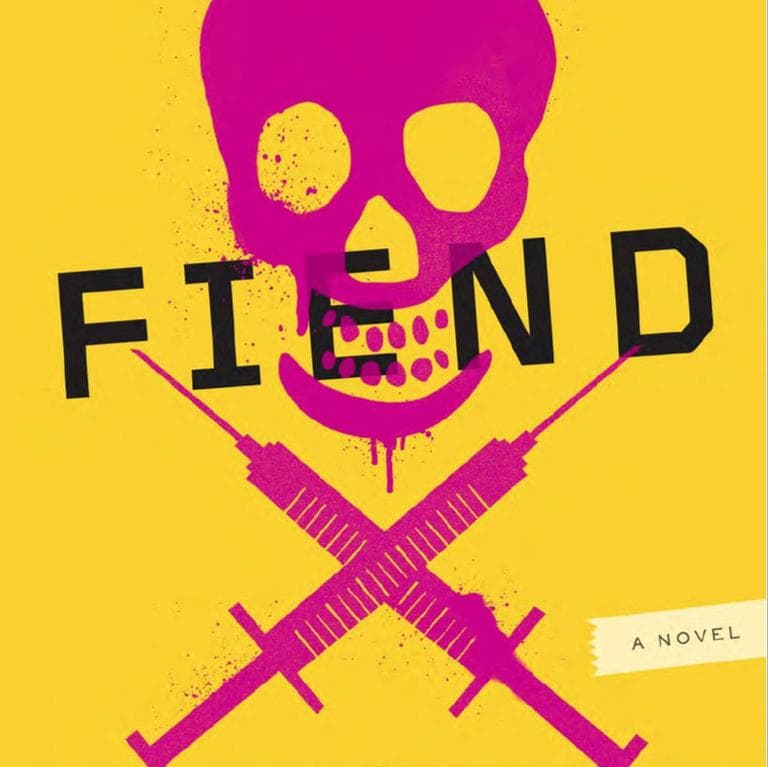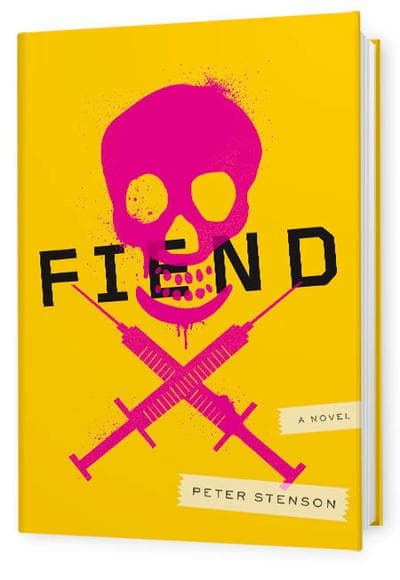Advertisement
‘Fiend’: Surviving The Zombie Apocalypse One Meth Hit At A Time

Chase Daniels looks out the window of the house where he and his best friend have been smoking meth for the past week and sees a little blonde girl. She’s down on all fours, playing with a nasty Rottweiler. His mind is hazy. He should do something, warn the kid, he thinks, but instead he just stands there. Then the girl lunges for the big dog’s throat. Then she eats the dog.
“I’m telling myself that it’s gone too far this time … Never have I experienced such vivid hallucinations,” Chase thinks at the start of Peter Stenson’s thrilling novel “Fiend" (Crown Publishers). Then she’s at the window—red with blood, her flesh peeling—eyeing him. Then she’s through the window, after them, giggling. And when his friend wallops her with an old typewriter, when his friend kills her, they’re not sure if they’ve saved themselves from a monster or if they’ve been sharing a hallucination and just murdered an innocent little girl.
As they venture out into the world, it slowly dawns on them that during their meth bender they’ve missed a zombie plague that’s taken over the world. And—working hypothesis—the only normal people left are meth heads because, maybe, the drug somehow inoculates their bodies against the sickness.

People have dubbed Stenson’s novel “Breaking Bad” meets “The Walking Dead.” (Read an excerpt here.) What his fresh premise does is add a reasonable and meaningful complication to the usual zombie story. The survivors must find or make more of the drug. But can this bunch of paranoid, lying, thieving but charismatic junkies keep it together well enough to survive?
There’s a sort of graveyard humor among the characters about what’s the difference between the zombies and the tweakers’ meth-ravaged bodies: “Like I take one look at you, no offense, and know you’re f---ing dying, like inside.” But the zombie apocalypse has given them one blessing: they can keep using the drug guilt free because now it’s the thing keeping them alive.
Stenson’s writing and thinking crackles. The tale reads with an authenticity perhaps owing to experience—the book jacket bio reports that the Denver-based author is “a recovering addict and has been sober for 10 years.” You burn through the pages.
Stenson offers all you’d want in a zombie story—the seeming all-clear, then the zombie hands reaching through the hole broken in the wall, the running away, the deadends, the shotgun blasts, the heart-pounding miraculous escapes. And a love triangle is introduced when Chase and best pal rescue an ex-girlfriend, who left Chase when she tried to get clean.

The ex also brings melancholy reflections on trying to get straightened out, of wearing a stupid uniform at some deadend retail job, “the moment when you realize that the best you can do, I mean the absolute f---ing best, is to be a less successful version of our parents,” of falling off the twelve-step sobriety program.
Zombie stories tend to be more popular and prolific in the United States during times of war and recession. And this novel is a child of our gloomy fatigue after long wars in Iraq and Afghanistan, the Great Recession, global warming.
Many end of the world stories start thrillingly, but don’t know how to end the end of the world. Even some of the most entertaining ones—Max Brooks’ 2006 “World War Z,” Daniel H. Wilson’s 2011 “Robopocalypse,” even Stephen King’s 1978 classic “The Stand”—struggle with resolution. How do you believably solve a problem that’s as big as the whole world? Stenson avoids that difficulty by keeping his focus tight—just this one small group of friends and their immediate meth associates desperately searching for salvation, one hit at a time.
This article was originally published on September 06, 2013.
This program aired on September 6, 2013. The audio for this program is not available.
